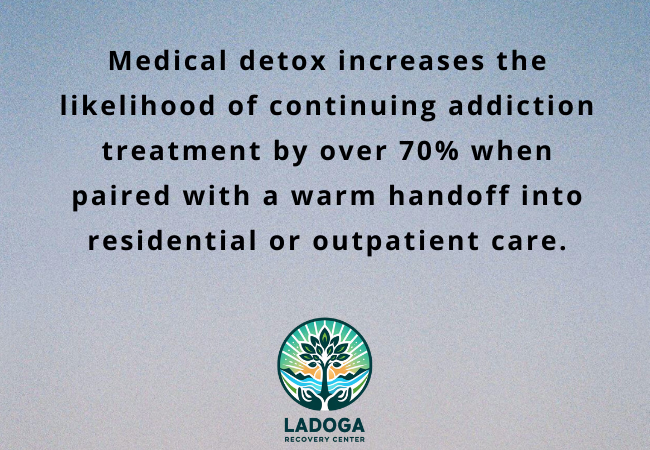When you’re ready to break the cycle of substance use, detoxification is the first and most essential step on the road to recovery. Detox is the process by which your body clears itself of drugs or alcohol, and it’s a necessary foundation before beginning long-term treatment. But not all detox programs are the same. From medically supervised inpatient detox to more flexible outpatient options, understanding your choices is crucial to a safe and successful recovery.
At Ladoga Recovery Center, we offer a variety of detox solutions tailored to the unique needs of each individual. Whether you need a comprehensive Detox Treatment Program in Indiana or are transitioning from a Residential Treatment Program in Indiana, our expert team is here to support you every step of the way.
Why Detox Is a Critical First Step in Recovery
Substance use affects the body on both a chemical and neurological level. Over time, the body becomes dependent on the substance to function normally. When use stops suddenly, it can trigger intense withdrawal symptoms—ranging from anxiety and irritability to seizures and hallucinations, depending on the substance.
Attempting to quit without support can be dangerous and often leads to relapse. A professionally managed detox program, like those at our Addiction Treatment Center in Indiana, provides medical oversight, emotional support, and a safer, more comfortable withdrawal experience.
The Main Types of Detoxification Programs
Detox isn’t one-size-fits-all. Different substances, medical histories, and severity levels call for different types of detox approaches. Here’s a breakdown of the most common types available:
1. Medical Detox (Medically Supervised Detox)
Best For: Alcohol, opioids, benzodiazepines, meth, and other drugs with severe withdrawal effects.
What It Is: Medical detox involves 24/7 care from doctors, nurses, and addiction specialists. Medications may be administered to ease withdrawal symptoms and prevent complications like seizures or delirium tremens (DTs). It’s the safest form of detox and is often the first step in an Alcohol Detoxification Program in Indiana.
Key Benefits:
- Constant medical monitoring
- Medication-assisted treatment
- Immediate intervention if complications arise
- Psychological support during acute withdrawal
2. Inpatient Detox
Best For: Individuals with co-occurring mental health disorders, history of relapse, or lack of support at home.
What It Is: Inpatient detox takes place in a residential facility where the individual stays full-time. It provides a structured, controlled setting that is ideal for those needing a more intensive level of care. Many Inpatient Treatment Programs in Indiana integrate detox into their continuum of services.
Key Benefits:
- Secure, substance-free environment
- Seamless transition into long-term treatment
- Access to mental health professionals
- Structured routines and nutritional support
3. Outpatient Detox
Best For: Individuals with mild addiction, no co-occurring mental health conditions, and a strong support system.
What It Is: Outpatient detox allows patients to live at home while attending scheduled treatment visits. This method is less intensive and requires the individual to be highly motivated and committed to sobriety. It is often offered by Drug Rehabilitation Programs in Indiana as a more flexible alternative to inpatient care.
Key Benefits:
- Maintain responsibilities at work or home
- More cost-effective
- Regular check-ins and medication management
Limitations:
- No 24/7 supervision
- Higher risk of relapse in early recovery
4. Social Detox (Non-Medical Detox)
Best For: Individuals with mild to moderate substance use and minimal risk of dangerous withdrawal symptoms.
What It Is: Social detox focuses on peer support and monitoring rather than medications. Staff are available for emotional support but cannot administer medical interventions. While helpful for some, it is not suitable for substances that involve physically dangerous withdrawal, such as alcohol or opioids.
Key Benefits:
- Supportive, structured environment
- Helps build emotional resilience
- Often used as a first step before further care
5. Holistic Detox Programs
Best For: Individuals who want to integrate mind-body wellness practices alongside traditional treatment.
What It Is: Holistic detox complements clinical care with alternative therapies such as yoga, acupuncture, massage, art therapy, and nutrition. This approach treats not only the physical symptoms of withdrawal but also emotional and spiritual aspects of recovery.
Key Benefits:
- Whole-person healing
- Reduces anxiety and promotes relaxation
- Prepares individuals for long-term recovery success
6. Rapid Detox (Use with Caution)
Best For: Often marketed for opioid users, though this method is highly controversial.
What It Is: Rapid detox involves sedating the individual while their system is quickly flushed of drugs using medication. While it sounds efficient, it poses significant health risks and is not widely recommended by addiction specialists.
Risks Include:
- Dangerous complications
- Emotional trauma post-sedation
- High relapse rates without follow-up care

The Importance of Choosing the Right Detox
Your detox journey should reflect your personal health, history, and recovery goals. A personalized plan, developed at a professional Substance Abuse Treatment Program in Indiana, ensures that you’re not only safely detoxing but also setting the stage for long-term sobriety.
Important factors in choosing the right detox program include:
- Substance(s) used and duration of use
- Co-occurring mental health conditions
- History of withdrawal symptoms or seizures
- Home environment and support network
- Willingness and readiness for inpatient vs. outpatient care
What Happens After Detox?
Detox is only the first step in a much longer journey. After the body is physically stabilized, treatment must continue to address the psychological and behavioral patterns behind substance use. This typically includes:
- Residential Treatment Programs
- Inpatient Therapy
- Counseling and behavioral therapy
- Group and family therapy
- Aftercare and relapse prevention planning
At Ladoga Recovery Center, our full continuum of care ensures that clients move directly from detox into customized treatment pathways that build the tools and resilience necessary for lasting recovery.
Why Choose Ladoga Recovery Center?
As a trusted Addiction Treatment Center in Indiana, we offer:
- Comprehensive Detox Options: From medical to holistic detox programs
- Certified Addiction Professionals: Compassionate care with clinical expertise
- Whole-Person Treatment: Integrated mental health and substance abuse care
- Continuity of Care: Smooth transitions into inpatient, residential, or outpatient programs
- Safe, Healing Environment: Our facility provides a secure and supportive atmosphere for recovery
Whether you’re beginning an Alcohol Addiction Treatment in Indiana or exploring your options for drug detox, our team is here to support you with personalized care and evidence-based treatment plans.
Conclusion
Detoxing from drugs or alcohol can feel overwhelming—but you don’t have to do it alone. Understanding the different types of detoxification programs empowers you to choose the safest and most effective option for your situation. At Ladoga Recovery Center, we are committed to helping individuals begin their journey to recovery with the support, compassion, and clinical care they deserve.
If you or a loved one is ready to take the first step toward sobriety, our team is here to help. Call us today at 844.628.4917 to learn more and start your recovery journey with confidence.
FAQs on Different Types of Detoxification Programs
What is the safest type of detox program?
The safest type of detox is a medically supervised detox, especially for substances like alcohol, opioids, or benzodiazepines. These programs offer 24/7 monitoring and medication to manage withdrawal symptoms safely.
Can I detox at home without medical help?
Detoxing at home can be dangerous, particularly from substances like alcohol or opioids, which can cause severe withdrawal symptoms. A professional Detox Treatment Program in Indiana ensures medical safety and better outcomes.
How do I know which detox program is right for me?
The right detox program depends on your substance use history, mental health, and home support system. A clinical assessment at Ladoga Recovery Center can help determine whether medical, inpatient, or outpatient detox is appropriate.
What happens after detox is complete?
After detox, it’s essential to transition into a Residential Treatment Program in Indiana or outpatient care to address the psychological and behavioral sides of addiction and reduce the risk of relapse.
How long does detox usually take?
Most detox programs last between 3 to 10 days, depending on the substance, duration of use, and the individual’s health. Severe cases may require longer stays in a structured facility like Ladoga Recovery Center.

